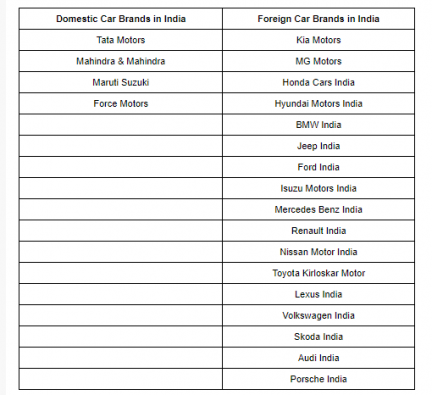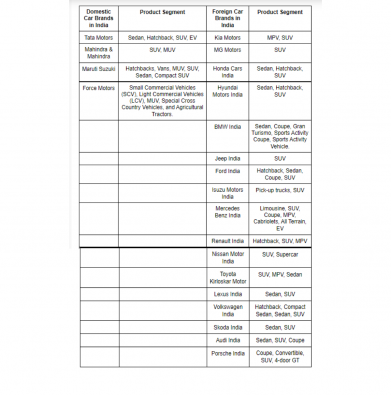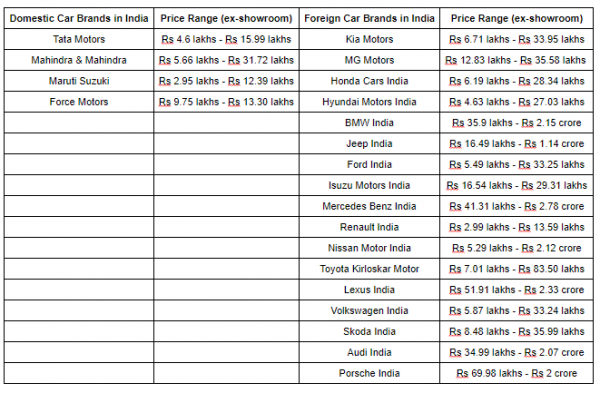The automotive industry is regarded as one of the world’s largest manufacturing sectors. Before independence, the Indian market was majorly seen as a market for imported vehicles. Thus, the industry mainly focused on aspects like servicing, dealership, financing, and maintenance of vehicles. It was only after a decade of Independence, that manufacturing of vehicles began in India. Now, the automotive industry is one of the major pillars of the Indian economy. International car brands manufacture and market their products in the country. India is regarded as the fourth-largest auto market in the world. We can expect it to reach third position by 2021. The aggressive growth of the Indian car market in the last few years has led to an increase in the demand for vehicles specifically 'Made in India'. The Indian automobile industry currently comprises of two-wheelers, three-wheelers, cars and trucks, which play a crucial role in the growth of the economy. This story will help you understand the comparison between Domestic vs Foreign car brands in India.
Domestic vs Foreign Car Brands in India: List of Automakers
Currently the homegrown automaker list comprises names like Tata Motors, Mahindra, and Mahindra, Maruti Suzuki and Force Motors. While brands which have Indian interest and foreign tie-up in the form of subsidiary companies, consist of names like Kia Motors, MG Motors, Honda Cars India, Hyundai Motors, Jeep India, Ford India, Isuzu Motors India, Renault India, Nissan Motors India, Toyota Kirloskar Motors, Volkswagen India, and Skoda India. These are mainly manufacturers who deal in mass market products. When we consider premium products then it is the turn of brands like BMW India, Mercedes-Benz India, Lexus India, Audi, Porsche India many among others. In comparison to 'Made in India' brands, the foreign brands demand a high price value for their product offering in the Indian automobile market.

Domestic vs Foreign Car Brands in India: Product Segment
Both domestic and foreign car brands cater to a variety of product segments. Breaking them down further, Tata Motors produces sedans, hatchbacks, SUV’s, and electric vehicles. Mahindra and Mahindra is more focused towards SUVs and MUVs. While Maruti Suzuki India's largest automaker stands to provide hatchbacks, van, MUV, SUV, sedans, and a compact SUV. As for Force Motors, they build small and light commercial vehicles, MUV alongside special cross-country vehicles. Coming to foreign subsidiary brands such as Kia Motor then they currently manufacture MPV and SUVs. MG Motors India is at the moment concentrating on SUV's. Talking about Honda Cars India, they make sedans, hatchbacks, and an SUV. Hyundai Motor India having the second largest market share in India offers a variety of hatchbacks, sedans and SUVs. American brand Jeep India emphasis only on SUVs for the market. While Ford India who have been around for a decent amount of time in the Indian auto sector cater to hatchback, sedan, SUV and Coupe. Isuzu Motor India mainly deals with pick-up-trucks and an SUV. French automaker Renault India manufacturers hatchback, MPV and SUVs in the country. Japanese automaker Nissan Motor India delivers SUVS, and a supercar to the Indian customer. Another brand from the same country, Toyota Kirloskar Motors produces sedan, MPV and SUVs.The Volkswagen Group consists of VW, Skoda, Audi, and Porsche who all make cars. VW India in this instance offers hatchback, compact sedan, sedan, and an SUV. While Skoda India caters to sedan and SUV followed by Audi India who stand to provide sedan, SUV, and coupe. Plus, Porsche India makes coupe, convertible, SUV, and 4-door GT for buyers in the country. German automaker BMW India provides sedan, coupe, Gran Turismo, Sports Activity Coupe and Sports Activity Vehicle. On the other hand, Mercedes Benz India product portfolio consists of limousine, SUV, Coupe, MPV, cabriolets, all-terrain vehicle and an EV.

Domestic vs Foreign Car Brands in India: Price Range
As stated already, the average price range of vehicles under domestic brands are bound to be cost effective basis segmentation. While the subsidiaries also have the potential to provide products that are not only value for money but also offer technology in line with global standards. This does not mean that domestic automakers are far behind, they are rather as well equipped to offer products that certify quality, performance, and comfort. Whereas in the case of foreign brands considering the premium ones, their price range is on the higher side given that they are CBU's (Completely Built Up) units as well as CKD's (Completely Knocked Down) units. Thus, the table below will help you understand the average price range of vehicles being offered in their individual product portfolio.
Looking at the Indian automotive industry in general, the demographics and customer demand seems to be changing year on year. Depending upon the purchasing power of an individual, domestic as well as foreign brands are no more out their reach. As per the requirement, a buyer can select any of them to seek a vehicle of his choice. Gone are the days when technology and looks of domestic brands used to be outdated in comparison to Indian subsidiaries and foreign brands. So, at the end, it all boils down to the perception and value proposition that a brand is willing to offer to the customer.






